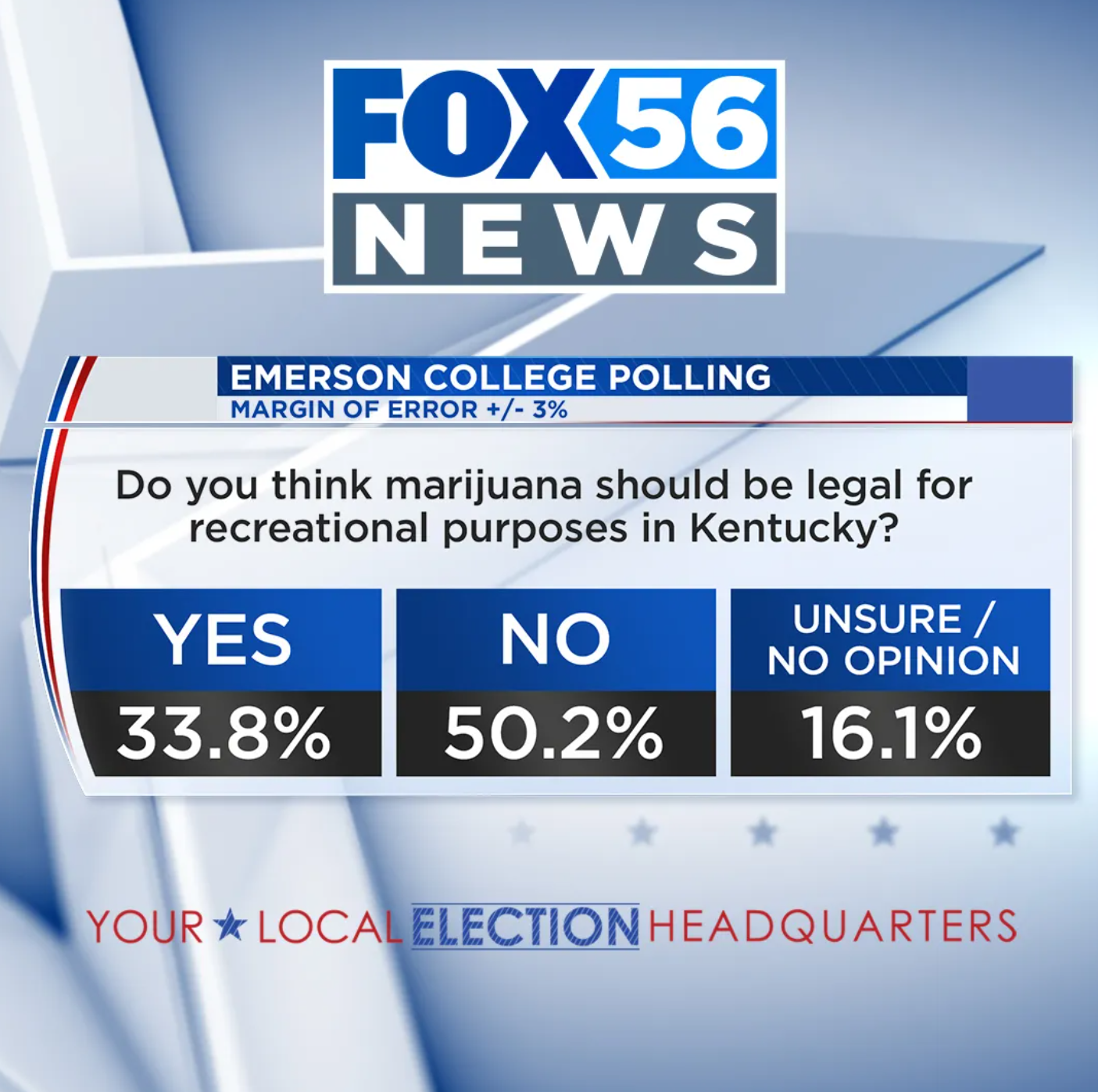FOX 56/Emerson poll: Age divide among Ky. Republicans on recreational marijuana
This article originally published by WDKY.
LEXINGTON, Ky. (FOX 56) — A new FOX 56/Emerson College poll found the majority of likely Kentucky Republican primary voters are against legalizing recreational marijuana.
Of the respondents, the majority (50.2%) do not think it should be legal in the state. Meanwhile, 33.8% said they support recreational marijuana use, and 16.1% were still undecided.
A new FOX 56/Emerson College poll found the majority of likely Kentucky Republican primary voters are against legalizing recreational marijuana. (FOX 56 News)
“I’ve seen other polls of the general electorate on marijuana where you see 60%-70% support for recreational marijuana in the general public, and so when you see 50% of Republican primary voters opposed to it, they’re a bit more out of step with the general voter, and again, a reflection that this culture war, right-wing element is going to be stronger in a small Republican primary,” said FOX 56 News political analyst Jonathan Miller.
Kentucky Republican primary voters under 50 years old were more likely to support recreational marijuana, with 46.0% of those between 18-49 voting “yes.” The poll found 34.1% of those aged 50-64 think it should be legalized, and 17.9% of those 65 and older support it.
REPUBLICAN GOVERNOR CANDIDATES
When asked about Kentucky’s upcoming Republican primary, respondents opposed to recreational marijuana preferred Attorney General Daniel Cameron (36.1%) for governor. Former United Nations ambassador Kelly Craft was favored by 29.5%, 14.6% were “undecided,” and 11.3% preferred state agriculture commissioner Ryan Quarles.
Cameron was the favorite among recreational marijuana supporters at 27%. Meanwhile, undecided voters (24.6%) were next among those who supported legalization. Craft followed at 20.7%, and Quarles came in at 13% for those who favor recreational marijuana use.
Likely Kentucky Republican voters who were “undecided” about recreational marijuana were also more likely to be undecided on their preferred candidate (31.5%).
MEDICAL MARIJUANA
In February, Gov. Beshear signed an executive order allowing Kentuckians diagnosed with certain serious medical conditions to use marijuana, but they were unable to legally buy or bring it into the state. The protection only allowed them to use it and have it in the state.
After multiple attempts to get through the Kentucky legislature, a medical marijuana bill was passed in March, a measure that had nearly 90% approval among Kentuckians. The medical marijuana bill passed the House 66-33 and was signed into law by the governor. The bill does not include smokable raw marijuana; only refined products like gummies, pills, vapes, and oils.
While Gov. Beshear’s executive order noted 21 medical conditions, Senate Bill 47 only highlights six qualifying medical conditions.
Those conditions include:
Any type or form of cancer regardless of stage
Chronic, severe, intractable, or debilitating pain
Epilepsy or any other intractable seizure disorder
Multiple sclerosis, muscle spasms, or spasticity
Chronic nausea that has proven resistant to other conventional medical treatment
Post-traumatic stress disorder
As patients wait for the program’s 2025 launch, Lauren Bratcher, deputy director of Kentucky NORML, hopes Kentucky can get a head start on creating some kind of medical registry.
“We have to build these registries; doctors have to register, and patients have to register, Bratcher told FOX 56. “In order for it to be legal in Kentucky, it has to be grown and processed here. It cannot cross state lines, so that takes time. We can’t just grow a little bit.”
MARIJUANA DUI TESTING
Kentucky has also considered changes to how marijuana is policed and attempted to update DUI laws in the state. The proposed marijuana DUI policy keeps police from punishing regular marijuana users for getting DUIs by making the tests more accurate.
The current blood test is considered unreliable because THC, the active component in marijuana, can stay in the blood system for long periods of time after using it. Senate Bill 228 wants to adopt a more precise blood test to better determine if drivers are under the influence. The bill did not make it into law for the regular 2023 General Assembly session.
The Foundation for Advancing Alcohol Responsibility found multiple states have adopted this type of testing, with varying levels of THC found acceptable. This rule would place Kentucky in the more forgiving bracket when looking at marijuana DUIs.
DELTA-8
Delta-8 THC was also approved for regulation and signed by Gov. Beshear in March, allowing for a legal alternative to marijuana.
The Cabinet for Health and Family Services will create regulations by August to raise the legal age to 21 to purchase or possess the product, move it behind the counter like tobacco products, and require a process known as “batch testing” for safety.
An original provision limiting the potency of the products was later removed. While Delta 8 is the main product the bill would regulate, it is broad enough to include all other forms of intoxicating hemp products like Delta 9 and 10.
Methodology: The FOX 56/Emerson College poll was conducted April 10-11, 2023. The sample consisted of 900 very likely Republican Primary Voters, with a margin of error (MOE) of +/- 3.2 percentage points. The data sets were weighted by gender, age, and education based on 2023 turnout modeling. Turnout modeling is based on US Census parameters, and Kentucky voter registration and voter turnout data (KY SOS).
It is important to remember that subsets based on demographics, such as gender, age, education, and race/ethnicity, carry with them higher credibility intervals, as the sample size is reduced. Survey results should be understood within the poll’s range of scores, and know with a confidence interval of 95% a poll will fall outside the range of scores 1 in 20 times.
Data was collected by contacting cell phones via SMS-to-web, an Interactive Voice Response (IVR) system of landlines, and a consumer list of emails.

